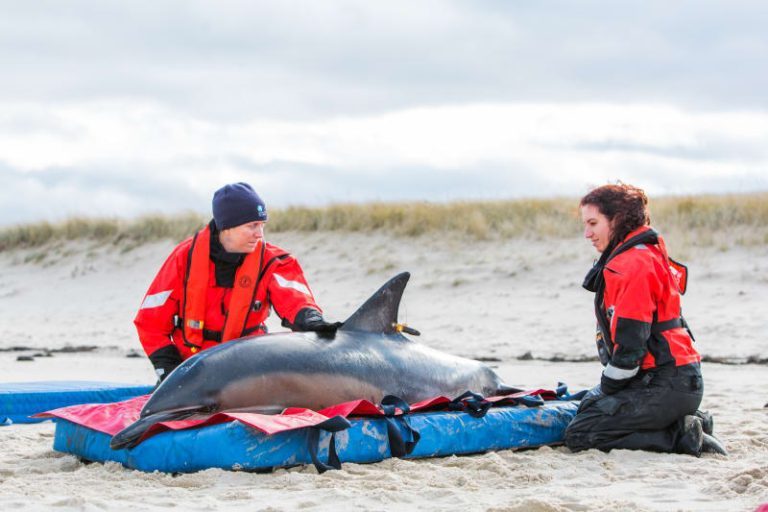Ten dolphins tragically died during Friday’s stranding event at The Gut, also known as Great Island, situated in Wellfleet near the Herring River.
In Wellfleet, Massachusetts, animal rescuers have been tirelessly working to prevent dozens of dolphins from venturing into shallow waters around Cape Cod following a distressing mass stranding event. The previous day, 125 dolphins found themselves stranded, prompting a swift and coordinated response from rescue teams.
On Saturday morning, efforts intensified as teams from the International Fund for Animal Welfare (IFAW) discovered a group of 10 Atlantic white-sided dolphins perilously swimming in dangerously shallow waters. With the dawn’s light, rescuers successfully guided this group back into deeper, safer waters, marking a crucial early success in their ongoing mission.
Simultaneously, scouts located another group of 25 dolphins swimming near Eastham, dangerously close to the shoreline. Throughout the morning, amidst dropping tides, rescuers persisted in their efforts to herd these dolphins away from the shallows, aiming to mitigate further strandings.
Tragically, ten dolphins succumbed during the initial stranding at The Gut, also known as Great Island, located in Wellfleet near the Herring River. This incident stands as the largest mass stranding recorded by IFAW during its 26-year presence in the Cape Cod area. The Gut’s unique geography, characterized by its hook-like shape and significant tidal fluctuations, contributes to frequent strandings, as noted by experts.
Misty Niemeyer, the organization’s stranding coordinator, described the challenges faced by rescuers on Friday. The operation spanned 12 grueling hours under relentless sun, complicated by treacherous mud conditions and the scattered distribution of dolphins across a wide area. Despite these adversities, Niemeyer emphasized the team’s determination to provide the stranded dolphins with the best possible chance of survival.
The rescue operation commenced with rescuers initially guiding dolphins on foot toward deeper waters. As the situation demanded more sophisticated measures, three small boats equipped with underwater pingers were deployed to assist in herding dolphins away from danger zones.
The collaborative rescue effort involved over 25 dedicated staff members from IFAW, supported by 100 trained volunteers. Additional support came from organizations such as the Whale and Dolphin Conservation, the Center for Coastal Studies, AmeriCorps of Cape Cod, and the New England Aquarium, highlighting the unified response from various entities committed to marine conservation.
As the situation continues to unfold, rescuers remain vigilant, monitoring the dolphins’ movements closely to prevent further strandings and ensure their safety in the waters surrounding Cape Cod.

